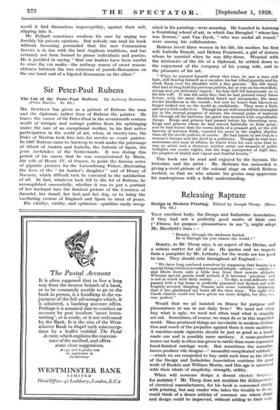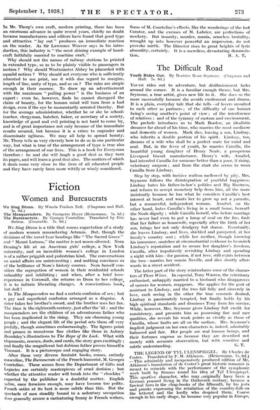Releasing Rapture
Design in Modern Printing. Edited by Joseph Thorp. (Benn. 10s. 6d.)
THAT excellent body, the Design and Industries Association, if they had not a perfectly good motto of their own (" Fitness for purpose—pleasantness in use "), might adopt Mr. Masefield's lines :-
"Beauty, through the darkness hurled.
Be it through me you shame the world ! "
Beauty, as Mr. Thorp says, is an aspect of the Divine, and a serious matter for all of us. He quotes and we requote from a pamphlet by Mr. Lethaby, for the words are too good to lose. They should echo throughout all England :-
" We have long confused ourselves by supposing that beauty is a special thing which is revealed to special adepts—artists !—critics !- and filters down only a little way from their remote altitude. Whereas special genius itself withers if it becomes ' precious ' and is not in touch with daily reality. . . To-day, a coal-delivery cart with a big horse so perfectly groomed and decked out with raigty-scoured dangling brasses and some vermilion trimming, that it has gladdened my heart all the time since. The sight of a Greek chariot could not have given me more delight, for this, too, was perfect."
Would that we all insisted on fitness for purpose and pleasantness in use in our daily lives We need not often
buy what is ugly, we need not often read what is -stupidly set out. Sometimes, of course, we must do so in this imperfect world. Mass-produced things are inevitable in modem civiliza- tion and much of the prejudice against them is mere snobbery.
A machine-made cigarette should be just as good as a hand- made one and is possibly more sanitary. A mass-produced
motor-car body is often less given to rattle than more expensive hand-finished carriage work. But sometimes the manufac-
turers produce vile designs—" mournful complicated rubbish —which we are compelled to buy until such time as the ideals of the Design and Industries Association continue the good work of Ruskin and William Morris, and this age is saturated with their ideals of simplicity, strength, utility.
When will someone design a decent electric fireplace. for instance ? Mr. Thorp does not mention the delinquencies of electrical manufacturers, for his book is concerned chiefly with printing, but any reader who takes the trouble to do so, could think of a dozen articles of common use whose shape
and design could be improved, without adding to their cost. In Mr. Thorp's own craft, modern printing, there has been an enormous advance in quite recent years, chiefly no doubt because manufacturers and editori haVe found that good type and attractive " lay out " produces an immediate -reaction on the reader. As Sir Lawrence Weaver says in his intro- duction, this industry is " the most shining example of hand- craft faithfully married to machine craft."
Why should not the names of railway stations be printed in extended type, so as to be plainly visible to passengers in motion ? Why should Westminster Abbey be placarded with squalid notices ? Why should not everyone who is sufficiently educated to use print, use it with due regard to margins, length of line, unity of type, and so on ? The rules are simple enough in their essence. To draw up an advertisement with the maximum " pulling power " is the business of an expert : even he, however, finds he cannot disregard the claim of beauty, for the human mind will turn from a bad design, even if the eye be momentarily arrested thereby. But for the average administrator, whether he or she be school- teacher, clergyman, butcher, baker, or secretary of a society, knowledge of good and evil printing is not hard to come by, and is of great importance not only because of the immediate results secured, but because it is a crime to engender and disseminate ugliness. We may all help to spread beauty. Mr. Thorp tells us very cleverly how to do so in one particular way, but what is true of the arrangement of type is true also of the arrangement of our lives. This is a book for Everyman therefore : he and she will laugh a good deal as they turn its pages, and will learn a good deal also. The matters of which it deals come very close to the lives of all educated people and they have rarely been more wittily or wisely considered.































 Previous page
Previous page